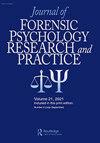Artificial neural network model for predicting child sexual offending: role of cognitive distortions, sexual coping, and attitudes
IF 1.1
4区 心理学
Q4 CRIMINOLOGY & PENOLOGY
Journal of Forensic Psychology Research and Practice
Pub Date : 2023-08-24
DOI:10.1080/24732850.2023.2249518
引用次数: 0
Abstract
ABSTRACTThis research aims to present additional knowledge about individuals with a history of sexual offenses against children in Portugal. Although the international literature mentions the presence of cognitive distortions as a common element for child sexual offending, it is known that another cognitive pathway developed since childhood and adolescence will have a significant weight in the definition of disruptive sexual behaviors. In this article, we focused on sexual attitudes and sex as a strategy for sexual coping and assayed to appreciate the relevance of these variables as predictors of Child Sexual Abuse (CSA). This research mainly aims to analyze a hierarchical and predictive model of these variables and cognitive distortion in the CSA. With resources to Artificial Neural Networks (ANN), we conclude that these variables, when associated, have a predictive accuracy of 82.3% in a sample that included individuals with a history of sexual offenses against children (N = 59) and the general community (N = 82). New future approaches can benefit from integrating coping strategies and sexual attitudes into CSA, adapted to the Portuguese context.KEYWORDS: Sexual offenseschild sexual abuseartificial neural networkscognitive distortions Disclosure statementNo potential conflict of interest was reported by the author(s).预测儿童性犯罪的人工神经网络模型:认知扭曲、性应对和态度的作用
摘要本研究旨在提供有关葡萄牙儿童性侵犯史的个人的额外知识。尽管国际文献提到认知扭曲是儿童性犯罪的常见因素,但众所周知,自童年和青春期以来发展起来的另一种认知途径将在破坏性性行为的定义中发挥重要作用。在这篇文章中,我们将重点放在性态度和性作为性应对策略上,并分析了这些变量作为儿童性虐待(CSA)预测因素的相关性。本研究的主要目的是分析这些变量和认知扭曲的分层预测模型。利用人工神经网络(ANN)的资源,我们得出结论,当这些变量相关联时,在包括有儿童性犯罪史的个人(N = 59)和一般社区(N = 82)的样本中,预测准确率为82.3%。将应对策略和性态度整合到CSA中,适应葡萄牙的环境,可以使未来的新方法受益。关键词:性犯罪儿童性虐待人工神经网络认知扭曲披露声明作者未报告潜在利益冲突
本文章由计算机程序翻译,如有差异,请以英文原文为准。
求助全文
约1分钟内获得全文
求助全文
来源期刊
CiteScore
1.80
自引率
12.50%
发文量
53

 求助内容:
求助内容: 应助结果提醒方式:
应助结果提醒方式:


